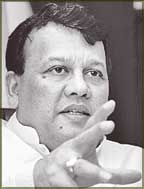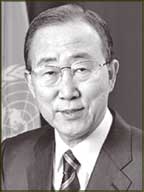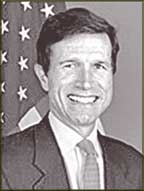Indian role is decisive
Wasantha Priya Ramanayake -Translated by A. A. M.
Nizam
We have respectability and attachment to the law of the country and
to the international law. Our commitment to international law is proven
by the international conventions we have signed. In the humanitarian
field we have signed more prudent conventions than the United States of
America. For example, the United States of America does not accept the
rights of a citizen to appeal to the International Human Rights
Commission. But we accept it.

Minister
Mahinda Samarasinghe |

Ban ki-Moon |

Robert O Blake |
In general, international law is considered as the law of the
powerful. In other words it is also termed as the ideology of sprats and
sharks. Whatever is mentioned in the conventions, the United Nations
Organization functions in an atmosphere of injustice similar to this. It
was because of this that countries like ours got together in the past
and established the Non-Aligned Movement. One of the pioneers of this
movement was Madam Sirimavo Bandaranaike. Following the collapse of the
Soviet bloc the strength of the Non-Aligned Movement was also
diminished. It has now become just a rubber-seal.
International community
We cannot indulge in politics as a country without understanding this
international atmosphere. But since countries like India is closer to us
and because India has become a powerful nation in the region, the devil
is not that dark as we think. It is even not difficult to settle the
account through a better management of international politics.
It is in such an international atmosphere that Sri Lanka completely
defeated the world's most ruthless terrorist organization. Just after
four months of this victory, a resolution favourable to Sri Lanka was
approved in the United Nations Human Rights Council. That was approved
because we defeated terrorism. Through this resolution our action of
defeating terrorism was lauded by many countries. The Western
international community did not like this resolution much. Some of them
even opposed it.
A majority of the third world countries supported the resolution. The
powerful Western countries said that the final stages of the
humanitarian operation were questionable. It may be assumed that the
propaganda in the Western media such as BBC and CNN and the ‘White Flag’
story of the journalist Marie Colvin who died recently also led to form
this opinion.
In the meantime, it is not a secret to anyone that the Secretary
General of the United Nations Ban ki-Moon visited Sri Lanka and signed a
joint statement with President Mahinda Rajapaksa. Through this document
the President agreed to investigate whether there were any human rights
violations during the war period. Even based on the international human
rights conventions we have signed, and as a country, there is nothing
wrong for agreeing to such a commitment.
LLRC
However, there is no agreement in this statement that a special
investigation will be carried on the final stages of the humanitarian
operations.
It was in accordance with that joint statement President Mahinda
Rajapaksa announced on June 16, 2010 the establishment of the Lessons
Learnt and the Reconciliation Commission. In the same year on September
16, the United Nations Secretary General Ban ki-Moon appointed the
Darusman Panel. Ban ki-Moon said that it was appointed for him to get
advice. In the same vein he says that it was also in accordance with the
joint statement signed with Sri Lanka. But what he says is not true. The
fallacy of it becomes clear from the Darusman's statements itself.
What Darusman attempts is to investigate a chain of events purported
to have occurred during the final stages of the war. There is nothing
like that mentioned in the joint statement. What Ban ki-Moon says is a
lie. This is a threat posed by Ban ki-Moon to our sovereignty. We do not
know why we did not succeed in stopping the attempts being made by Ban
ki-Moon through Darusman to investigate on the final stages of the war.
It was in support of the actions of Darusman that Channel 4 television
presented a documentary saying that it relates to incidents that took
place during the final stages of the war.
Subsequently, the Darusman Panel expressed willingness to meet the
members of the Lessons Learnt and Reconciliation Commission appointed by
Sri Lanka and others from outside that Commission. The Sri Lankan
government vehemently rejected this request and told the Darusman Panel
that if necessary they could visit Sri Lanka and give evidence before
the Lessons Learnt and Reconciliation Commission. Because of this there
was no face to face meeting between the two parties. Both parties were
encouraged to issue two separate reports.
Darusman report
Also, there was no shortage for exchange of letters between Ban ki-Moon's
office and Sri Lanka's Ministry of External Affairs. It seems that at
one stage we were very flexible.
It clearly shows our respect for international conventions and
international laws. Because of this our Ministry of External Affairs
agreed to respond to 15 questions presented by the Darusmans and Ban ki-Moon
about the government stance and activities of the LLRC.
Some may see this as controversial. But we do not know whether it is
correct to get the Presidential Secretariat connected to this exercise
with the knowledge of the President. Also it may be argued by some that
it is similar to opposing them initially and subsequently sending a
response to Darusman's question by post. If our politicians are
enthusiastic enough to be prudent in their handling of local and
international politics, this type of suspicions and blames will not even
surface from the Opposition. Nevertheless, because of this response the
recommendations of the Lessons Learnt and Reconciliation Commission
became internationalized even before the report was released.
Human rights laws
At the moment there is no validity for the Darusman report. It has
got submerged among the documents of Ban ki-Moon's files. But can
someone get the notion that the problem has been internationalized by
providing a response to Darusmans in advance? But whatever it is, it
seems that the Lessons Learnt and Reconciliation Commission report and
its recommendations have come to our rescue at the moment.
Currently the United States and other Western countries are demanding
to implement the recommendations of the Lessons Learnt and
Reconciliation Commission which they rejected at the time when it was
established. It is such a resolution that they are going to unveil at
the United Nations Human Rights Commission in Geneva in the forthcoming
days. It is also a victory for us to find that the Western nations
hanging on to the recommendations of the LLRC report when Darusmans have
become outdated. It is a defeat for them.
Now Sri Lanka has an opportunity to say boldly; "You people did not
listen to what we said then. You all hung on to Darusman and denigrated
our Commission, even questioned about the integrity of our Commission.
Now you all are demanding to implement its recommendations. We were
right then and we are right now also. What is the hurry you all have got
now? We need sufficient time to implement the recommendations of the
Commission. Be patient till then". It was this message that Minister
Mahinda Samarasinghe diplomatically and suavely delivered to the
international community. Minister Samarasinghe told the international
community on behalf of Sri Lanka that day; "Be a little patient. We have
already started the work".
"Attention has been focused on certain incidents about which evidence
has been submitted to the Commission. It is the opinion of the
Commission that these matters should be investigated further. The
Attorney General is at present studying the recommendations relating to
the charges of violating international human rights laws".
It seems that the international community needs such an assurance. It
seems that yet the resolution has not been properly drafted. Even in the
recent days the US Secretary of State for Asian Affairs Robert O Blake
said that some points of the resolution is still being drafted. It may
be that they are redrafting the resolution in accordance with our
reaction. There is a possibility for a resolution to be submitted or
not, and even if submitted not to hold a vote on it. It is clear that
they want to get assurances on certain things. It is being done at the
moment.
There is no doubt that India is playing a decisive role in this
regard. Announcing in advance that India is on our side is also not a
good diplomatic move. It is true that India is with us. Without
announcing it in an ignoble manner it is better to place them in an
honourable position on our behalf. India is like a relation of ours.
They stand with us at all times. Neither the United States nor the
Western countries attempt to do any harm to SAARC countries overriding
India. This is how the international regions have been sliced and
segregated.
At the same time our honesty and innocence should also be displayed.
The report of the Lessons Learnt and Reconciliation Commission has
carried out that task. It is because of that even India's role has
become easier. Therefore, the Indian stance will become very decisive on
a resolution being brought against Sri Lanka. Mostly it may be a
resolution cut and chopped with the mediation of India and one that can
be described in the context that the devil is not that dark as we think. |



